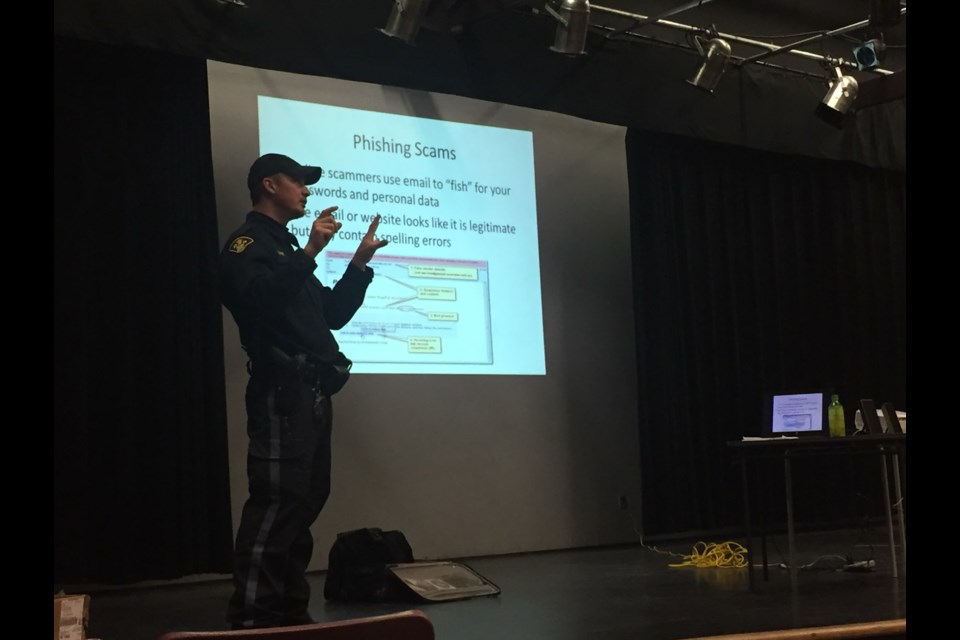Scam artists are continuously finding new ways to get items from citizens. On Nov. 30, a public presentation conducted by the Ontario Provincial Police was held at the Lester B. Pearson Civic Centre to help residents understand the many scams that are present and how to protect themselves.
Community Safety Officer Constable Phil Young described scam artists as selfish and ignorant.
"Scammers don't care about you," he explained to the crowd of eager learners. "They just want your money and personal information."
Young informed the crowd of multiple ways a scam artist can attack someone. They can reach you by telephone, online, mail, and in person and can also steal your identity.
"The tactics they use are through urgency, or tell you you have won something, through email money transfers and harassing phone calls," he said. "The biggest one is through emails."
In light of the recent Canada Revenue Agency email scams, Young said it's important to inform the public on how to recognize a scam and what you can do to not fall victim.
"We have received somewhere about 10 visits a day from people putting in complaints about emails and phone calls from the CRA saying they're behind on their taxes and to pay the balance or an arrest warrant will be issued," he said. "It's all fake."
To make this scam look real, Young explained that the fraudsters used what they call "Call Spoofind." This can help a scam artist disguise the caller ID to make it look like a real company or business.
"People were showing us that they were also receiving calls from the OPP and showed the caller ID as 'OPP'," he said. "The OPP does't have caller ID. It would just say 'blocked' or 'unknown'."
Young described how new scams come to light daily and told the crowd ways to notice them and how to avoid getting caught up in the scam artist's plan. The following is a list of popular scams and what they do:
- Romance scams: This scam is a fake dating website to attract people to want to make new friends and find a relationship. The way the scam works, is the user will have to pay money to send and receive emails. They will develop a relationship with someone online. Once a relationship is established, the scammer will use a story of how they want out of their country or how a loved one is sick to draw money from the victim.
- Inheritance scams: This scam is through email or through mail. It will explain a distant loved one has passed away and left an inheritance for the victim. It will also say to the person to send money to a certain address or through electronic funds transfer in order to receive the inheritance.
- Vacation scams: This is either through telephone, email or by mail. This scam will tell the victim they have won a trip of their choosing but in order to claim the trip, they must pay a certain fee. This is a popular scam with citizens aged between 60-69 years old.
- Charity scams: This scam is depicted as having someone come to your home and explain which charity they work for. They will ask for a donation. "When this happens, check for three things: a name tag, a photo on the name tag and the name of the charity," explained Young. "A full list of CRA registered charities is available online."
Young also described scams where the fraudster will require an iTunes card. "These cards can be used as cash in their country once they have a serial number," he explained.
This fact stunned residents.
During the presentation, Young said that open and unsecured wi-fi access as a way for a scam artist to obtain personal information from someone.
"Everything you do online leaves a mark," he said. "Once you post something online, it's there for good."
He described this as "digital footprints" or "digital dossiers." He also advised residents that if they are using a public wi-fi signal to not use it for personal information, like online banking passwords.
"Check your privacy settings," he said. "Make sure you always check your passwords and change them."
Young also expressed the need to call the the Canadian Anti-Fraud Centre, which the nearest location is set in North Bay.
"The CAFC work closely with the RCMP and protect people," he explained.
If you, or someone you know, is being scammed, he urges residents to contact the CAFC at 1-800-495-8501 or through the website at www.antifraudcentre.ca.
